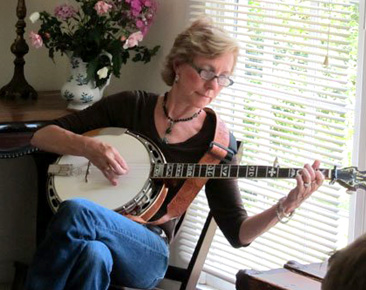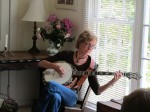
 Louisa Branscomb didn’t, as Stephen Foster might have put it, come from Alabama with a banjo on her knee. She couldn’t. Girls didn’t play banjo.
Louisa Branscomb didn’t, as Stephen Foster might have put it, come from Alabama with a banjo on her knee. She couldn’t. Girls didn’t play banjo.
“I heard that a million times when I was girl,” Louisa told me the other night. She, like others of her gender, couldn’t break into the inner circle at jams, so she decided to break the rules and play the loudest instrument she could find.
She’s been breaking the rules, and breaking ground in bluegrass, ever since. On Thursday morning, as the kickoff speaker for the 16th Annual Women’s Leadership Conference at Ferrum College in southwestern Virginia, she’ll be sharing her experiences with other women. The title of her speech: “Bad Girls and Banjos: Breaking the Wrong Rules the Right Way.”
All 10 of the rules she’ll present grow out of her experiences as a bluegrass pioneer, not only as a banjo player but as a founding member of one of the first all-female bluegrass bands (the Bluegrass Liberators in North Carolina in 1971), and one of the first women to play an instrument in a touring band for an extended period. During eight years on the road, she recalled, “I almost never saw another woman playing. I was quiet and I was shy, and I probably would have benefited if there had been more women.”
Louisa calls herself “an egalitarian, feminist and humanist.” But she’s quick to point out that her rules apply not only to women but to anyone who ends up in undefined territory or is a minority in a given situation.
During Thursday’s presentation, Johnny Williams will find himself in the minority role. He and Jeanette Williams will join Louisa on stage to play a few songs that illustrate the rules that Louisa spells out. “He’ll be OK,” Louisa deadpanned. “I’m sure he’ll have a few quips.”
One thing Louisa learned when she challenged the rules and conventions of the day is that pioneers get watched closely. Very closely. “You have to be prepared to be ostracized and to be focused on.” Every time she picked up a banjo, people watched to see how she would do, waiting for her to fail. So you not only have to bold, you have to good.
“The light is going to be shined on you a little more,” she said. “And that’s an opportunity. You have to face the hardship, have patience, live through it and figure out how you want to address it. You just might make a difference to somebody behind you.”
The first time Louisa remembers breaking the rules to get ahead in music, she was a youngster at church camp. A girl in her cabin had a ukulele, but she wouldn’t let Louisa or any other bunkmates play it. So Louisa lied to a counselor to get out of canoeing and sneaked back to the cabin. She not only played the uke, but she wrote her first song.
Who knows what those of us in bluegrass and those in Thursday’s audience would be missing out on if Louisa had followed the rules and gone canoeing.







